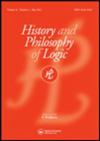亚里士多德逻辑学中的连通性
IF 0.5
3区 哲学
Q3 HISTORY & PHILOSOPHY OF SCIENCE
引用次数: 0
摘要
本文章由计算机程序翻译,如有差异,请以英文原文为准。
Connexivity in Aristotle’s Logic
At APr 2.4 57a36–13, Aristotle presents a notorious reductio argument in which he derives the claim ‘If B is not large, B is large’ and calls that result impossible. Aristotle is thus committed to some form of connexivity and this paper argues that his commitment is to a strong form of connexivity which excludes even cases in which ‘B is large’ is necessary. It is further argued that Aristotle’s view of connexivity is best understood as arising from his analysis of affirmation and negation in terms of combination and separation: a proposition that separates two terms cannot entail a proposition that combines the same two terms. In order to motivate this account of connexivity, this paper interprets Aristotle as emphasising the predicative structure, especially the copulae, of the argument’s component propositions. The arguments for this are based on a consideration of the larger context of APr 2.2–4. A reconstruction of the argument using propositional variables does not fully capture Aristotle’s intentions.
求助全文
通过发布文献求助,成功后即可免费获取论文全文。
去求助
来源期刊

History and Philosophy of Logic
综合性期刊-科学史与科学哲学
CiteScore
0.80
自引率
0.00%
发文量
24
审稿时长
>12 weeks
期刊介绍:
History and Philosophy of Logic contains articles, notes and book reviews dealing with the history and philosophy of logic. ’Logic’ is understood to be any volume of knowledge which was regarded as logic at the time in question. ’History’ refers back to ancient times and also to work in this century; however, the Editor will not accept articles, including review articles, on very recent work on a topic. ’Philosophy’ refers to broad and general questions: specialist articles which are now classed as ’philosophical logic’ will not be published.
The Editor will consider articles on the relationship between logic and other branches of knowledge, but the component of logic must be substantial. Topics with no temporal specification are to be interpreted both historically and philosophically. Each topic includes its own metalogic where appropriate.
 求助内容:
求助内容: 应助结果提醒方式:
应助结果提醒方式:


